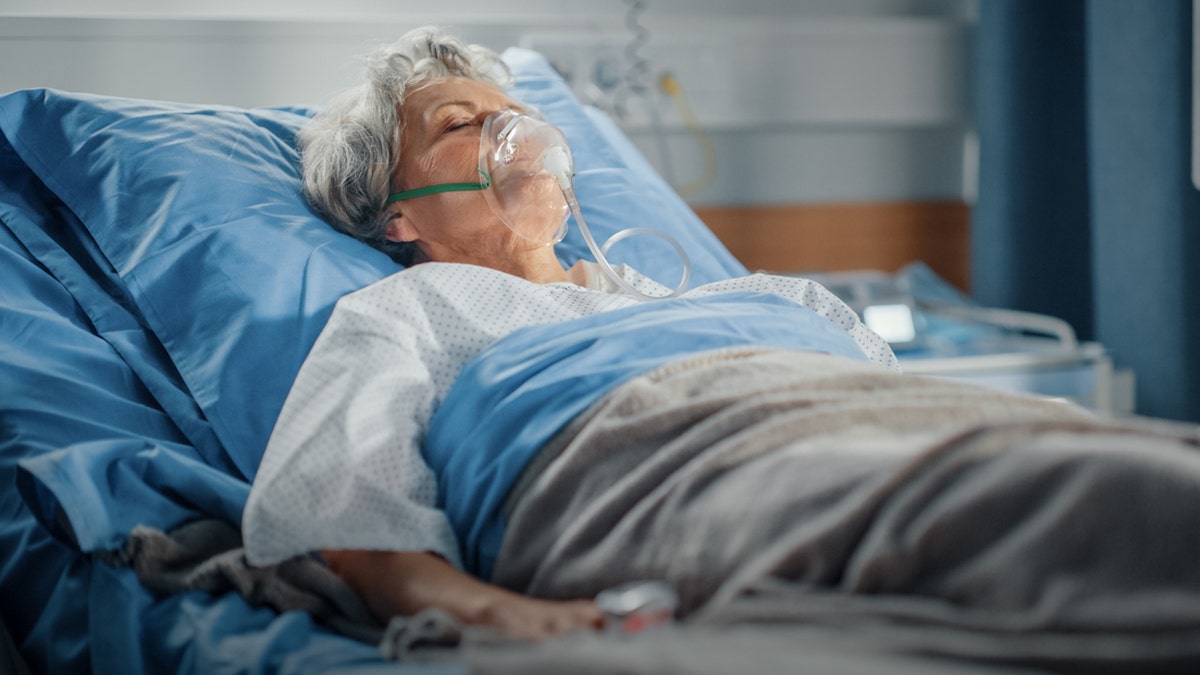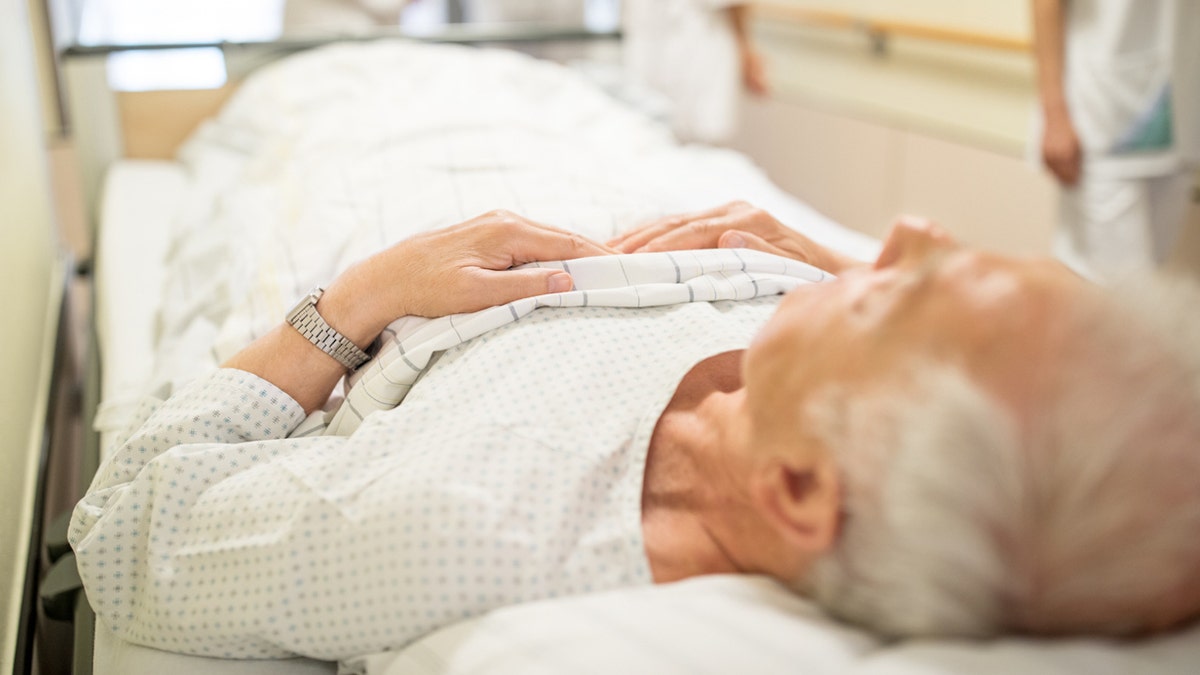Fox News Flash top headlines for March 31
Fox News Flash top headlines are here. Check out what's clicking on Foxnews.com.
Adults who are admitted to the hospital are often inappropriately diagnosed with — and treated for — pneumonia, new research suggests.
These misdiagnosed adults almost always receive a full course of antibiotics that may not be necessary, according to a new study published in JAMA Internal Medicine.
Among older adults who were treated for community-acquired pneumonia in the hospital, 12% were misdiagnosed, researchers found.
Among those patients who were misdiagnosed, 88% received a full antibiotic treatment course — with 2% of those experiencing adverse side effects from the medication, the study also found.
The Centers for Disease Control and Prevention (CDC) estimates that about 47 million courses of antibiotics are prescribed annually in the U.S. for infections that don’t require that course of action.

Among older adults who were treated for community-acquired pneumonia in the hospital, 12% were misdiagnosed, researchers found. (iStock)
Overuse of antibiotics can lead to resistance, meaning that the bacteria becomes strong enough to withstand the medication.
Each year, over 23,000 deaths occur in the U.S. due to antibiotic resistance, per the CDC.
This can limit treatment options and make it more difficult for doctors to treat and cure infections.
Each year, over 23,000 deaths occur in the U.S. due to antibiotic resistance, per the CDC.
Main types of pneumonia
There are two primary types of pneumonia: community-acquired and hospital-acquired.
Community-acquired pneumonia (CAP) describes a type of pneumonia in a patient who has not recently been hospitalized.
In these scenarios, patients acquire the lung infection while in a community setting, according to the National Institutes of Health (NIH).

Overuse of antibiotics can lead to resistance, meaning the bacteria becomes strong enough to withstand the medication. (iStock)
Hospital-acquired pneumonia occurs after patients are admitted to the hospital.
They don’t have the infection when they're first admitted, but acquire it later after being exposed to bacteria in the hospital setting.
Many patients with community-acquired pneumonia are treated without needing to be hospitalized.
Certain individuals with CAP, however, may require hospitalization if they have serious medical problems, severe symptoms, are unable to eat or drink, are over age 65, or are taking antibiotics but not improving, the NIH noted.
CAP is one of the most common causes of hospitalization in the U.S., according to the CDC.
What the study found
Researchers at the Veterans Affairs Ann Arbor Healthcare System and the University of Michigan Medical School – led by lead researcher Ashwin B. Gupta, M.D., clinical associate professor at the University of Michigan Health – examined patient records from the Michigan Hospital Medicine Safety Consortium, an initiative to improve the hospitalized care of patients.
Patients in the study were admitted to the hospital for general care and later were diagnosed with pneumonia and were treated with antibiotics on the first or second day of admission.
They analyzed approximately 17,000 adults who were hospitalized between July 1, 2017, and March 31, 2020, at 48 hospitals in Michigan.
Patients in the study were admitted to the hospital for general care and later were diagnosed with pneumonia and were treated with antibiotics on the first or second day of admission.
Participants were considered "inappropriately diagnosed" if they had fewer than two symptoms of pneumonia or if their chest X-rays tested negative for the infection. (In other words, if they got the diagnosis but didn't have two symptoms or positive X-rays, the diagnosis was wrong.)

Patients in the study were admitted to the hospital for general care and later were diagnosed with pneumonia and were treated with antibiotics on the first or second day of admission. (iStock)
The study found that an inappropriate diagnosis of community-acquired pneumonia among hospitalized patients is common – especially among certain groups, such as older adults or those with dementia and altered mental status.
Those who were inappropriately diagnosed almost always received a full course of antibiotics, the researchers noted.
Common symptoms
A classic diagnosis of pneumonia involves typical symptoms — such as cough, fever, chills and shortness of breath — combined with radiographic evidence on a chest X-ray, according to experts.
HEALTH CARE IS ‘OVERWHELMINGLY COMPLEX’ FOR OLDER ADULTS, EXPERTS SAY: ‘EVER-INCREASING HURDLE’
The X-ray is necessary because many symptoms can overlap with other conditions.
"When you present to the hospital with cough or shortness of breath, for example, the list of potential etiologies is quite broad," lead researcher Gupta told Fox News Digital via email.

A classic diagnosis of pneumonia involves typical symptoms — such as cough, fever, chills and shortness of breath — combined with radiographic evidence on a chest X-ray. (iStock)
"We found that often, those who likely have an underlying non-pneumonia etiology (e.g., congestive heart failure) are being classified as having pneumonia and are treated as such," he continued.
"Inappropriate diagnosis and treatment of pneumonia may have implications, such as delays in understanding the actual problem or adverse effects related to antibiotic treatment."
Dangers of unnecessary antibiotics
"Inappropriate diagnosis is not benign," the lead researcher warned.
"It means that the understanding of the underlying cause of a patient’s illness may be delayed or missed altogether."
He added, "Antibiotic therapy is not benign, either — our study demonstrated that full durations of antibiotic therapy in this population are associated with antibiotic-associated adverse events."
"Inappropriate diagnosis … means the underlying cause of a patient’s illness may be delayed or missed altogether."
Outside experts also warned of the risk.
"I think the study is alarming in that many patients (one out of eight, or over 10%) are receiving inappropriate diagnoses of pneumonia and being given full treatment courses," Dr. Scott Roberts, associate medical director of infection prevention at Yale School of Medicine in New Haven, Connecticut, told Fox News Digital.
He was not involved in the study.

Common side effects of antibiotic use include an itchy, full-body rash; nausea and diarrhea; and yeast infections, according to the CDC. (iStock)
"This is especially problematic because the patient population where this is occurring are the ones most at risk for the adverse events associated with antibiotic use."
Roberts emphasized the need for providers to diagnose conditions accurately before subjecting patients to full courses of antibiotics, which may be unnecessary and could lead to adverse side effects.
CLICK HERE TO SIGN UP FOR OUR HEALTH NEWSLETTER
Common side effects of antibiotics include an itchy, full-body rash; nausea and diarrhea; and yeast infections, according to the CDC.
Serious side effects may include life-threatening allergic reactions and a bacterial infection called C. diff (Clostridioides difficile), which can lead to severe colon damage and sometimes death.

A doctor emphasized the need for providers to diagnose conditions accurately before subjecting patients to full courses of antibiotics. (iStock)
"Diagnosis is challenging, and by and large, providers are trying to best care for their patients," Gupta noted.
"We often think about problems related to underdiagnosis of conditions (e.g., missed infection), though there are real risks to inappropriate diagnosis as well," he said.
Study limitations
The researchers likely underestimated the number of patients who were inappropriately diagnosed, as the signs and symptoms of pneumonia have significant overlap with other conditions, the researchers noted.
The study was also not designed to assess "causation," Gupta pointed out.
CLICK HERE TO GET THE FOX NEWS APP
"So, while we can say that there is an association between a full duration of antibiotics and antibiotic-associated adverse events, we cannot say that a full duration of antibiotics caused the antibiotic-associated adverse events," he continued.
He said he hoped that "this work will provide a framework on which providers, hospitals and health systems can calibrate the accuracy of their pneumonia diagnoses among hospitalized patients."










































